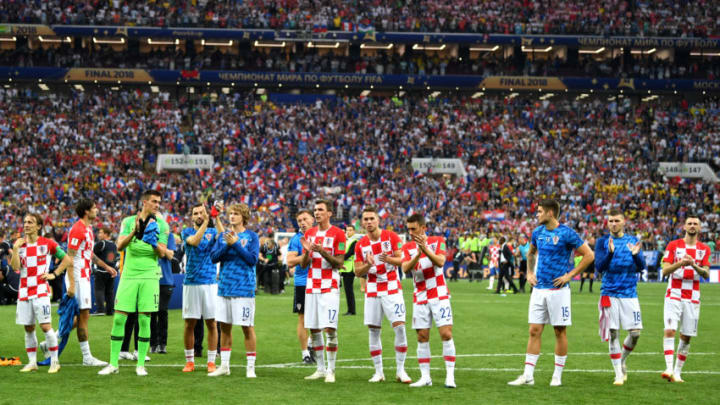Croatia find glory in World Cup final defeat
By Liam Bekker

Croatia’s magical World Cup journey came to an end on Sunday with a loss to France in the final but the nation as a whole will have found glory in defeat.
For better or worse, soccer and politics inevitably collide, particularly so at World Cups. For Croatia, the former cannot be separated from, nor perhaps even exist without, the latter. The success of their national soccer team can’t be fully appreciated without an understanding of the checkered past from whence the country obtained its independence and the current challenges it faces.
Less than 30 years ago the nation of Croatia didn’t exist, at least not in its current shape and form. Following a period of political instability in the Yugoslav region, war broke out between Croatia and the then-Socialist Federal Republic of Yugoslavia and its Serbian affiliates. The battle effectively ended in 1995 following the signing of the Erdut Agreement, but thousands had been killed and thousands more displaced.
The scars of the war live on in the memories of most living in the nation of just over four million people, including national team captain Luka Modric. The Real Madrid star fled his home at the age of six after his family’s house was razed and his grandfather killed during the war. Teammates Dejan Lovren (affected by the concurrent war in Bosnia) and Mario Mandzukic share a similar tale with the families of both players having fled to Germany to escape the horrors which so many of their countryman faced.
Many like the aforementioned trio turned to and found safety and sanity in soccer and in 1998, just three years after the Erdut Agreement had been signed, Davor Suker led Croatia to the semifinals at the 1998 World Cup. There they fell just short to the hosts and eventual champions, and 2018 final opponents, France.
A region which had for nearly half a century contributed to the strength of Yugoslavia, Croatia’s success in France should have come as less of a surprise but it nonetheless laid the foundation for the nation to qualify for all-but-one World Cup tournament since. The squad of ’98 set a benchmark for future squads which saw Croatia perennially labelled with the dark horse tag.
Next: The best player at every World Cup team
Croatia failed to build on the foundation laid with the subsequent generations consistently disappointing at the tournament over the course of the next 20 years. The nation’s failure to cement its place as a soccer superpower can in many ways be traced to systemic corruption and scandal which has plagued their soccer federation.
The dire state of soccer in Croatia is such that no proper youth system exists, only five pitches meet UEFA’s international standards and the national team had for a long period been held captive by former Dinamo Zagreb chairman Zdravko Mamic. Mamic has since been sentenced to prison but not before dragging Modric and Lovren into the depths with him; the pair face perjury charges for their testimonies during the legal proceedings against him.
Yet despite the struggles of past and present, the dark horse tag has persisted and it followed Croatia into the 2018 World Cup in Russia. There, boasting a squad of players with nearly 1000 caps between them, they were drawn in a group alongside Argentina, Nigeria and Iceland.
A perfect record of three wins from three saw them progress to the knockout stages for the first time since their debut in 1998. Consecutive penalty shootout victories over Denmark and hosts Russia followed before an extra-time goal from Mandzukic saw Croatia secure their place in their first ever World Cup final with a victory over England.
In doing so, Modric and co. eclipsed the achievements of the golden generation and helped Croatia become the smallest nation to reach the final of the competition since Uruguay in 1950. Their accomplishment was rewarded with a clash against France and a shot at redemption against their nemesis of ’98.
It ultimately proved a step too far.
Mandzukic and Ivan Perisic both scored on the night but it was their respective contributions at the other end of the pitch which ultimately proved telling. The former, who was Croatia’s top goalscorer at the tournament with three goals, opened the scoring for France with an unfortunate own goal, the first ever such goal in a World Cup final.
Perisic found an equalizer minutes later but soon went from hero to villain with a handball in the box which handed France an opportunity to restore their lead. Antoine Griezmann obliged and France never looked back, with Paul Pogba and Kylian Mbappe adding to the lead before Mandzukic’s consolation effort.
Though defeated on the day, Croatia were anything but losers. Theirs was a group of players who had faced greater odds than most and achieved the unthinkable by simply reaching the final. That they were unable to return to their young homeland with the World Cup trophy will detract little from the magnitude of their achievements. They arrived in Russia as dark horses but will return home as the real deal. If the class of ’98 were the golden generation, this team are platinum. The new benchmark for future generations.